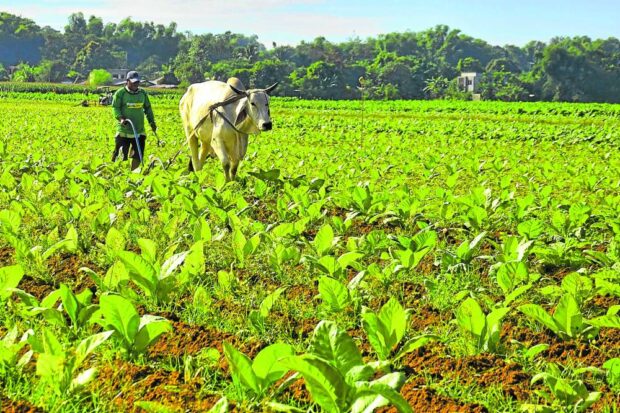WHO urges nations to plant food crops, not tobacco

ILOCANDIA’S GREEN GOLD | A farmer works in his tobacco farm at Barangay Macayo in Alcala, Pangasinan, in this January photo. Growing tobacco has sustained generations of farmers in the Ilocos region, where the cash crop is considered as “green gold.” (Photo by WILLIE LOMIBAO / Inquirer Northern Luzon)
MANILA, Philippines — “It’s time to grow food, not tobacco.”
The World Health Organization (WHO) has made this appeal to countries in the Western Pacific region, including the Philippines, describing tobacco farming as a “threat to food security and nutrition.”
Governments, according to WHO, should convert tobacco plantations into farms for sustainable food crops, which it said could help achieve food security at the local level.
“Imagine if we used the same 1 million hectares to grow nutritious food. We could nourish millions of people, [and] help children grow and develop,” Zsuzsanna Jakab, acting regional director for the WHO-Western Pacific, said in a statement to mark the World No Tobacco Day on May 31.
A WHO report titled “Grow food, not tobacco” released last week sought to show how tobacco farming endangers not only the health of farmers and their families as a result of occupational poisoning, but also poses environmental threats due to deforestation, contamination of water sources and soil degradation.
“Tobacco growing compounds the food security issues faced by these countries—scarce arable land is not being used to grow much needed food crops, and forests are also being destroyed to create room for tobacco production,” WHO said in the May 25 report.
Bloated economic value
The organization noted that tobacco is also “erroneously perceived to be a highly profitable cash crop,” blaming industry leaders that bloat the economic value of tobacco production.
The “lack of government support” for tobacco farmers to find viable food crops also hinders them from switching to alternative livelihoods, the report added.
According to WHO, the Philippines is committed “to promote economically viable alternatives for workers and farmers,” as a party to the Convention on Tobacco Control, an international treaty enforced in 2005 as a response to the “globalization of the tobacco epidemic.”
The Philippines is one of the world’s top 50 tobacco producers, with 28,380 hectares of land allotted for tobacco farming, based on the latest figures from the Food and Agriculture Organization of the United Nations.
Separate data from the Philippine Statistics Authority showed that the total output of tobacco dried leaves in the country from October to December last year rose by 8.5 percent to 1,330 metric tons.
Northern Mindanao was the largest producer of tobacco for the same period, accounting for 99.5 percent of the country’s overall production.
Official figures showed that the government collected P83 billion in cigarette excise taxes in the first seven months of 2021.
As of 2020, the tobacco industry supports the livelihood of some 2.18 million people as workers or their dependents nationwide.
Producers
Tobacco is widely grown in the Luzon provinces of Ilocos Sur, Ilocos Norte, Abra, La Union, Pangasinan, Isabela, Cagayan, Nueva Vizcaya, Quirino, Tarlac and Occidental Mindoro, according to the National Tobacco Administration.
In Mindanao, tobacco is grown in Sarangani, Bukidnon, Maguindanao, Misamis Oriental, Cotabato and Zamboanga del Sur.
WHO, in the same report, cited national and local government initiatives in the Philippines, such as beekeeping, that had helped tobacco farmers make the transition to other livelihood opportunities.
However, an Inquirer report last month found that tobacco farmers, especially those in Sarangani province, are being excluded from the assistance programs of the Department of Agriculture as the government prioritizes boosting food production.
Meanwhile, the Department of Health (DOH) on Tuesday urged the Department of Trade and Industry (DTI) to “strictly enforce” the provisions of Republic Act No. 11900 or the Vaporized Nicotine and Non-Nicotine Products Regulation Act.
The charter, which lapsed into law on July 25 last year, transferred exclusive regulatory powers to DTI from the Food and Drug Administration.
In a statement, the DOH called on the DTI “to proactively scan the market and confiscate said products that are unregistered and violative of the vape law, including those that have flavors that are found to attract the youth.”
Harmful vapes
WHO had warned that vapes “are undoubtedly harmful, and that flavors appealing to children and advertising through social media platforms are among the tactics employed by tobacco and related industries to attract younger generations.”
The health department also noted that it is currently working to integrate e-cigarette, or vaping product use-associated lung injury, or Evali, to the country’s national surveillance system.
“We are also coordinating with the appropriate medical authorities on the guidelines on determining and managing Evali cases,” it said.
Previously called Vapi (vaping associated pulmonary illness), Evali refers to severe lung illness cases caused by the use of electronic cigarettes or vapor products. The first case was identified in 2019, according to the American Lung Association.














